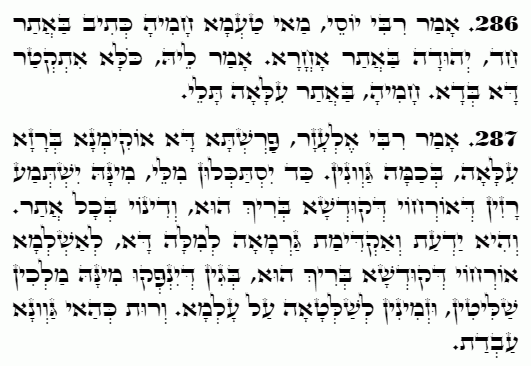Daily Zohar # 4675 – Acharei Mot – The link between Tamar and Ruth
Daily Zohar 4675

Hebrew translation:
287. אָמַר רַבִּי אֶלְעָזָר, הַפָּרָשָׁה הַזּוֹ בֵּאַרְנוּ בְּסוֹד עֶלְיוֹן בְּכַמָּה גְוָנִים. כְּשֶׁיִּתְבּוֹנְנוּ בַדְּבָרִים, מִמֶּנָּה יִשָּׁמְעוּ הַסּוֹדוֹת שֶׁל דַּרְכֵי הַקָּדוֹשׁ בָּרוּךְ הוּא וְדִינָיו בְּכָל מָקוֹם. וְהִיא יָדְעָה וְהִקְדִּימָה עַצְמָהּ לַדָּבָר הַזֶּה, לְהַשְׁלִים אֶת דַּרְכֵי הַקָּדוֹשׁ בָּרוּךְ הוּא כְּדֵי שֶׁיֵּצְאוּ מִמֶּנָּה מְלָכִים שַׁלִּיטִים, שֶׁעֲתִידִים לִשְׁלֹט עַל הָעוֹלָם. וְרוּת עָשְׂתָה כְּגוֹן זֶה.
.
Zohar Acharei Mot
Continued from previous DZ
#286
Rabbi Yossi said: What is the reason that in one place it says “her father-in-law” (חמיה) and in another place it says “Yehuda” (יהודה)? He answered: Everything is connected to one another. “Her father-in-law” (חמיה) is linked to a higher place.
Explanation (Rabbi Ashlag): “Her father-in-law” (חמיה) alludes to the father of the husband of the Malchut, which is Chokmah, for Chokmah is the father of Zeir Anpin. “Yehuda” here symbolizes Zeir Anpin, as the name of Hashem (הויה) is found within the name Yehuda (יהודה). The text raises the question: why does it say “her father-in-law” (חמיה) in one place and “Yehuda” (יהודה) in another? Are these not two different levels? The answer is that they are interconnected, meaning it refers to Zeir Anpin when it is united with and dressed in Chokmah. Thus, when it says “her father-in-law,” it refers to the higher level, Chokmah.
#287
Rabbi Elazar said: This section has been explained with a supernal secret in several ways. When one examines these matters, the secrets of the ways of Hashem and His laws are everywhere, as we have explained above. Tamar knew all of this, and she prepared herself for this matter to fulfill Hashem’s ways so that kings and rulers, who would eventually rule the world, would come from her. Ruth also acted this way, for Ruth aroused Boaz to perform yibbum (levirate marriage), just as Tamar did.
Notes:
The Zohar highlights how both women (Tamar and Ruth), through their intuitive understanding of the will of Hashem and their courageous and proactive actions, help ensure the continuity of a sacred lineage. Their actions are seen as part of a larger divine plan orchestrated by Hashem to bring about leaders who will rule the world and fulfill the purpose of Creation. This shows that human actions, even those that might seem unconventional, can be deeply aligned with higher spiritual purposes when they are guided by an understanding of Hashem’s will.
{||}

 Previous: Acharei Mot
Previous: Acharei Mot

